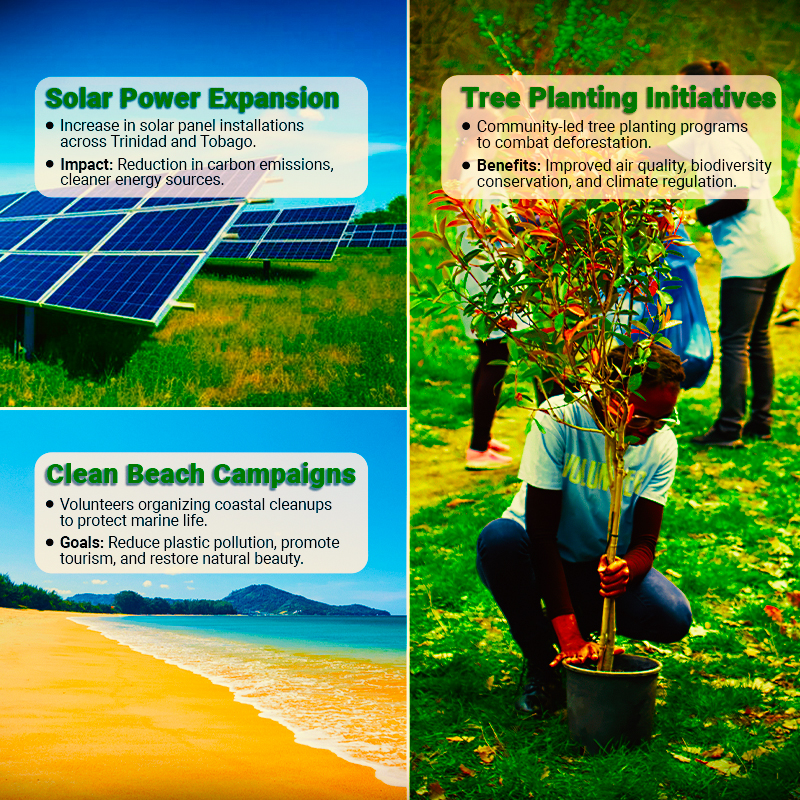Creating a Regenerative Economy for Trinidad and Tobago
The next United National Congress (UNC) government will spearhead the creation of a Regenerative Economy, transforming Trinidad and Tobago's waste management system into a resource recovery and energy production sector.

Transform Waste into a Resource
Establish a nationwide waste to energy program that converts municipal waste into hydrogen and other valuable resources.
Develop modern sorting facilities to separate waste by material type, ensuring maximum recovery and repurposing.
Redirect waste away from landfills towards sustainable energy production, reducing landfill expansion and environmental hazards.

Build a Hydrogen Economy
Construct waste to hydrogen facilities to generate clean energy for industries, transportation, and public utilities.
Transition public transportation, including buses and garbage collection fleets, to hydrogen-powered vehicles.
Develop hydrogen fueling stations across the country to support private and commercial adoption of hydrogen-powered transport.

Modernize Waste Management
Upgrade waste collection systems to ensure efficient and timely removal of waste from communities.
Phase out open-air dumping and invest in sanitary landfill solutions to prevent pollution and health hazards.
Enhance recycling programs and encourage public-private partnerships to support sustainable waste management.

Drive Economic Growth & Job Creation
Establish manufacturing hubs that utilize recycled materials for new products, fostering industrial expansion.
Create thousands of high-quality jobs in waste management, energy production, and advanced manufacturing.
Offer tax incentives and grants to encourage businesses to invest in green energy and regenerative economy initiatives.
Support
Support Community & Public Health
Reduce airborne toxins caused by open burning of waste, improving air quality and reducing respiratory illnesses.
Minimize contaminated water sources by eliminating improper waste disposal that affects groundwater and marine life.
Provide formal employment opportunities to waste pickers and informal waste collectors, improving their working conditions and earnings.

Expected Benefits

Economic Growth
- Reduced government expenditure on waste management through private-sector-driven resource recovery.
- Increased government revenue through new industrial activity and green energy exports.
- Enhanced investment attractiveness, positioning Trinidad and Tobago as a leader in Caribbean sustainability.
Waste Management
- Significant reduction in landfill reliance, extending landfill lifespan and reducing waste overflow.
- Establishment of a nationwide recycling ecosystem, turning waste into valuable materials.
- Prevention of coastal and marine pollution, protecting tourism and fisheries industries.
Innovation & Industrial Development
- Development of hydrogen-powered industries, from transportation to manufacturing.
- Support for research and development in clean energy and waste conversion technologies.
- Integration of smart infrastructure to track and optimize waste management operations.
Improved Quality of Life
- Cleaner communities with reduced waste-related health risks.More job opportunities in sustainable industries, offering higher wages and career growth.
- Access to cheaper, cleaner energy sources that reduce dependence on fossil fuels.
Be Part of the Change Trinidad & Tobago Deserves
Join us as we build a brighter, safer, and more prosperous future for every citizen. Stay informed, get involved, and make your voice count in shaping the nation’s destiny.
Health
Environmental & Health Benefits
Drastic reduction in carbon emissions, contributing to Trinidad and Tobago’s climate goals.
Lower levels of toxic air pollutants, reducing cases of asthma and other respiratory diseases.
Protection of biodiversity and ecosystems from waste contamination and illegal dumping.


